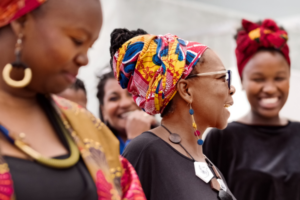“I came out at home and then I came out at work,” says Sanna Patricia Sekaule (49), whose story illustrates the importance of family support and acceptance, and bringing your whole self to the workplace.
Tell us your experience as a worker, a woman and someone who identifies as a lesbian
Despite our progressive laws and rights, lesbian, gay, bisexual, transgender and intersex (LGBTI) people continue to face discrimination and violence. Discrimination and violence can lead to exclusion. The exclusion can harm the experience of an LGBTI person in the workplace. I believe bringing your whole self to work allows you to be happy not just in your personal life but also in your professional life.
When I joined the floor sales team at Edcon Limited in 1998 I was out and visible. Initially, many of my co-workers were sceptical because they did not understand LGBTI people. Some people, particularly Christians, thought I had demonic possession. They wouldn’t touch or hug me because they thought lesbianism is contagious! But I did not compromise my identity to fit in. Eventually, people got used to me and they would even out me to people who did not know me.
You say you entered the workplace ‘butch’, what do you mean?
At first, I dressed in women’s clothes. But immediately after I got my first paycheck I bought men’s clothing. I was a tomboy and not feminine at all. I wore a tie and shirt and shaved my hair. You’d know me when you see me. For me, butch fashion wasn’t just an aesthetic. It conveyed my comfortability, energy and attitude.
How did management and staff respond when you came across as more tomboy?
Homophobia was rife and the workplace was full of religious people. My co-workers were confused and did not understand. Others were afraid of me and thought they could just pray for me and I would get ‘cured’. The management didn’t give me any trouble, except my clothing did not meet their expectations. They saw a woman and expected me to wear dresses and blouses. But then I would still show up to work in men’s clothing and I think that was a bit challenging for them.
What was the response of the customers?
There’s often an assumption that customers will discriminate against LGBTI workers. I did not experience any problems from the customers. I think it’s because I gave good service, and I am kind, bubbly and friendly.
Did you maintain the butch/tomboy identity throughout your time at Edcon?
Identities can be confusing for some people in our community. You tend to assume that you must behave like a tomboy when you love and are attracted to girls. My lesbian co-worker who was also a friend is feminine. Eventually, I realised that I also liked to be feminine. So I started wearing women’s clothes, and this confused people in and outside the workplace. Some people were curious and wanted to know if I was now straight and going to marry a man.
Did your partner come to see you at the workplace?
In the 1990s my partner and I were both butch. Later I changed to be feminine and she stayed butch. She would visit me at work and my colleagues knew her. Most people got used to the relationship, except about three men who were homophobic. It took a long time for me and these men to be on speaking time, but I stood my ground despite their aggressiveness. A few other men – especially when I was feminine – made advances but I would decline. They took the rejection in stride and were never aggressive towards me.
Is there anything that stands out from your experience as a worker who is a lesbian?
Yes, my experience with a co-worker who was a pastor and homophobic. She did not want to look at me or speak to me, and it troubled me for a very long time. As time passed, I think she realised that I was not what she thought I was. Our relationship changed for the better and we became friends to date. She is a staunch Christian and she now accepts me for who I am. She is like a mother to me.
I identify as a Christian. I know God and that God loves me regardless of my sexual identity. People found it strange that I am a Christian. To avoid disagreements and discomfort, I did not entertain any discussions about Bible verses on homophobia.
Many people have horrible thoughts about people who are gay, for example, that we don’t have good character, and that we are controlled by demons. But just like anyone we can be good, respectful and loving.
Did you see any shifts in workplace policies and attitudes?
Yes, particularly in the past decade. More managers who are LGBTI were employed at Edcon and this shifted the attitudes at the workplace a lot. The staff treated these managers well.
Concerning worker-related benefits and rights, the company was inclusive and did not discriminate against employees based on their sexual orientation. For example, my partner was included in my medical aid cover and I got compassionate leave when she fell ill. But I had to get the bank to certify that my partner and I were in a relationship to claim for travel allowance. I don’t know if people in heterosexual relationships were required to provide similar proof.
It sounds like your work experience was relatively pleasant and you didn’t struggle…
I worked in the retail sector, which I think employs many people who are LGBTI+ and have come out at work. This helps somewhat in creating diversity and inclusion. So, yes, my experience was not horrible, albeit a few cases of homophobia.
The company filed for voluntary business rescue in 2020 and I got retrenched. The biggest struggle for me now is not being productive. I also feel disconnected from the support system for LGBTI+ people that I made while at work. Most of my friends at home are straight. And there are no entertainment establishments for LGBTI+ people in the area.
What advice would you give to young lesbians coming into the workplace?
I would say to live your truth. At the same time, don’t force who you are on anyone. This can be difficult to balance because every workplace has different dynamics. Consider the situation in your workplace before coming out. Importantly, remember you are protected by the constitution and labour laws. Homophobic managers and staff cannot discriminate against you because of your sexual orientation.
What inspires and strengthens you?
I came out at home and then came out at work. The support of my family gave me the confidence and strength to go out in the world. The whole family – my mother, my sister, my 99 years old grandmother – supported me and respected that I am a lesbian. My mother’s only worry was that she would not have grandchildren through me, but I assured her I have options such as adopting. I am passing on what I have learned to my young niece and nephew who are also gay. If you are supported by your family you gain the strength to face the world.
You might like: Negotiating inclusivity and against discrimination | Popularising FEDUSA’s LGBTI+ resolution and the lessons learned advocating for union members who are LGBTI+.







